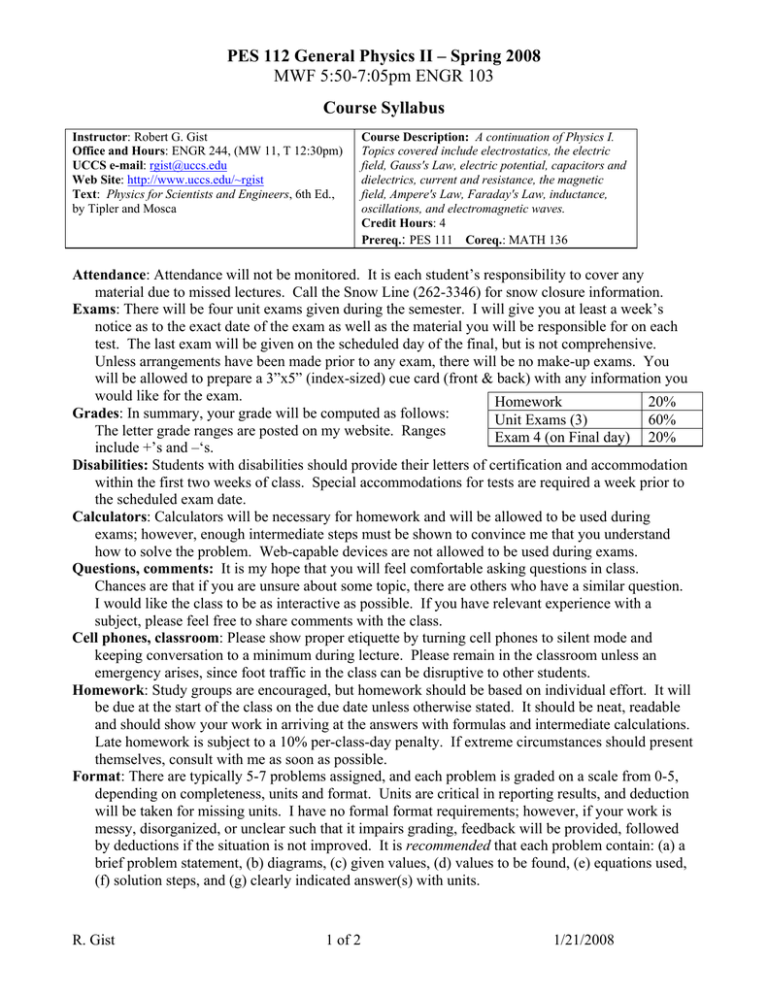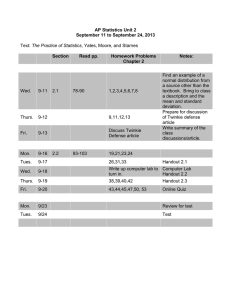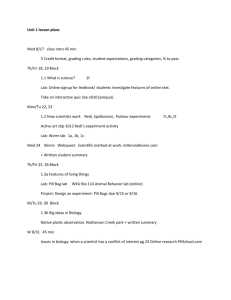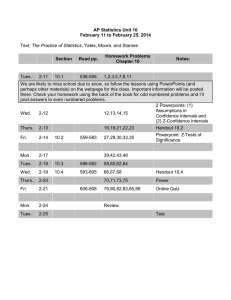PES 112 General Physics II – Spring 2008 Course Syllabus
advertisement

PES 112 General Physics II – Spring 2008 MWF 5:50-7:05pm ENGR 103 Course Syllabus Instructor: Robert G. Gist Office and Hours: ENGR 244, (MW 11, T 12:30pm) UCCS e-mail: rgist@uccs.edu Web Site: http://www.uccs.edu/~rgist Text: Physics for Scientists and Engineers, 6th Ed., by Tipler and Mosca Course Description: A continuation of Physics I. Topics covered include electrostatics, the electric field, Gauss's Law, electric potential, capacitors and dielectrics, current and resistance, the magnetic field, Ampere's Law, Faraday's Law, inductance, oscillations, and electromagnetic waves. Credit Hours: 4 Prereq.: PES 111 Coreq.: MATH 136 Attendance: Attendance will not be monitored. It is each student’s responsibility to cover any material due to missed lectures. Call the Snow Line (262-3346) for snow closure information. Exams: There will be four unit exams given during the semester. I will give you at least a week’s notice as to the exact date of the exam as well as the material you will be responsible for on each test. The last exam will be given on the scheduled day of the final, but is not comprehensive. Unless arrangements have been made prior to any exam, there will be no make-up exams. You will be allowed to prepare a 3”x5” (index-sized) cue card (front & back) with any information you would like for the exam. Homework 20% Grades: In summary, your grade will be computed as follows: Unit Exams (3) 60% The letter grade ranges are posted on my website. Ranges Exam 4 (on Final day) 20% include +’s and –‘s. Disabilities: Students with disabilities should provide their letters of certification and accommodation within the first two weeks of class. Special accommodations for tests are required a week prior to the scheduled exam date. Calculators: Calculators will be necessary for homework and will be allowed to be used during exams; however, enough intermediate steps must be shown to convince me that you understand how to solve the problem. Web-capable devices are not allowed to be used during exams. Questions, comments: It is my hope that you will feel comfortable asking questions in class. Chances are that if you are unsure about some topic, there are others who have a similar question. I would like the class to be as interactive as possible. If you have relevant experience with a subject, please feel free to share comments with the class. Cell phones, classroom: Please show proper etiquette by turning cell phones to silent mode and keeping conversation to a minimum during lecture. Please remain in the classroom unless an emergency arises, since foot traffic in the class can be disruptive to other students. Homework: Study groups are encouraged, but homework should be based on individual effort. It will be due at the start of the class on the due date unless otherwise stated. It should be neat, readable and should show your work in arriving at the answers with formulas and intermediate calculations. Late homework is subject to a 10% per-class-day penalty. If extreme circumstances should present themselves, consult with me as soon as possible. Format: There are typically 5-7 problems assigned, and each problem is graded on a scale from 0-5, depending on completeness, units and format. Units are critical in reporting results, and deduction will be taken for missing units. I have no formal format requirements; however, if your work is messy, disorganized, or unclear such that it impairs grading, feedback will be provided, followed by deductions if the situation is not improved. It is recommended that each problem contain: (a) a brief problem statement, (b) diagrams, (c) given values, (d) values to be found, (e) equations used, (f) solution steps, and (g) clearly indicated answer(s) with units. R. Gist 1 of 2 1/21/2008 PES 112 General Physics II – Spring 2008 MWF 5:50-7:05pm ENGR 103 Significant Dates Date Mar 24 – Mar 30 May 19 (Monday) Event Spring Break Final Exam Note No class 4:30 to 7:00pm Schedule (subject to change) Topic Date 23-Jan 25-Jan 28-Jan 30-Jan 1-Feb 4-Feb 6-Feb 8-Feb 11-Feb 13-Feb 15-Feb 18-Feb 20-Feb 22-Feb 25-Feb 27-Feb 29-Feb 3-Mar 5-Mar 7-Mar 10-Mar 12-Mar 14-Mar R. Gist Wed Fri Mon Wed Fri Mon Wed Fri Mon Wed Fri Mon Wed Fri Mon Wed Fri Mon Wed Fri Mon Wed Fri Notes Overview, Elec. Charges Ch 21 Application Gauss's Law Ch 22 Gauss's Law Ch 21 HW due Application Electric Potential Ch 23 Electric Potential Ch 22 HW due Application Unit Review Review Ch 23 HW due Exam #1 Capac. & Dielectric Ch 24 Capac. & Dielectric Application Current & Resistance Ch 25, part 1 Current & Resistance Ch 24 HW due Application D.C. Circuits Ch 25, part 2 D.C. Circuits Ch 25-1 HW due Application Unit Review Review Ch 25-2 HW due Exam #2 2 of 2 Date 17-Mar 19-Mar 21-Mar 24-Mar 26-Mar 28-Mar 31-Mar 2-Apr 4-Apr 7-Apr 9-Apr 11-Apr 14-Apr 16-Apr 18-Apr 21-Apr 23-Apr 25-Apr 28-Apr 30-Apr 2-May 5-May 7-May 9-May 19-May Mon Wed Fri Mon Wed Fri Mon Wed Fri Mon Wed Fri Mon Wed Fri Mon Wed Fri Mon Wed Fri Mon Wed Fri Mon Topic Notes Magnetic Fields Ch 26 Magnetic Fields Application Spring Break Spring Break Spring Break Mag. Field Sources Ch 27 Mag. Field Sources Ch 26 HW due Application Faraday's Law Ch 28, part 1 Faraday's Law Ch 27 HW due Application Unit Review Review Ch 28-1 HW due Exam #3 Inductance Ch 28, part 2 Inductance (RL Circuits) Application A.C. Circuits Ch 29 A.C. (RLC) Circuits Ch 28-2 HW due Application Electro-magnetic Waves Electro-magnetic Waves Ch 29 HW due Review Exam #4 1/21/2008








